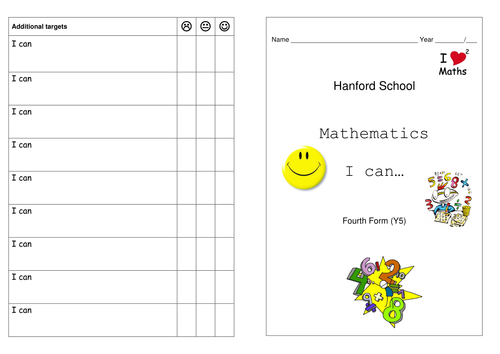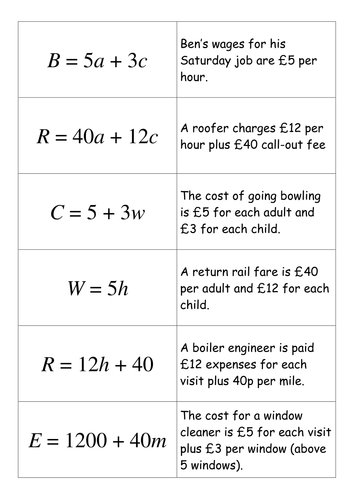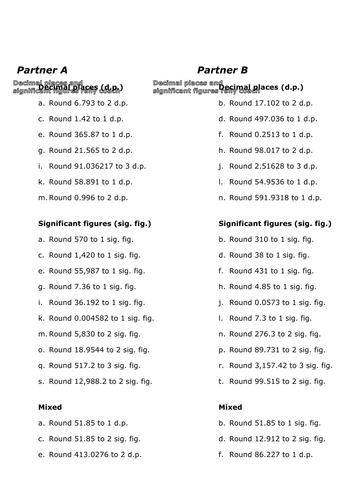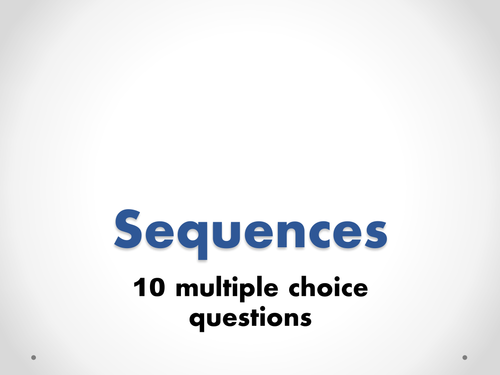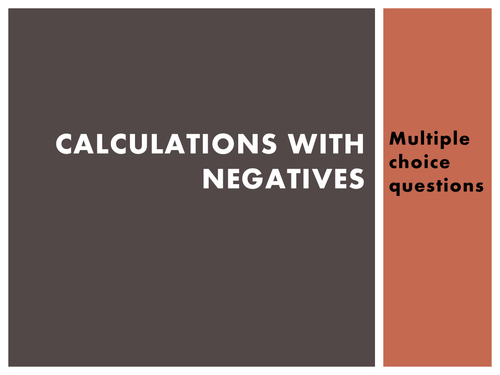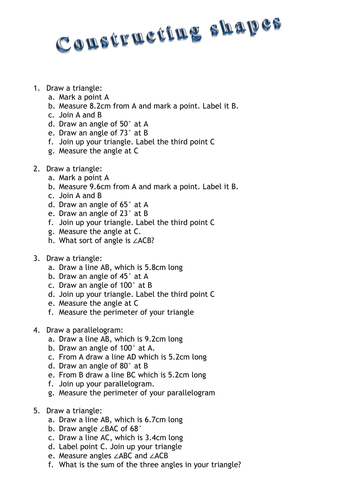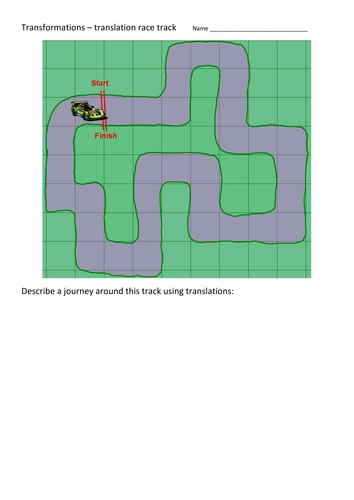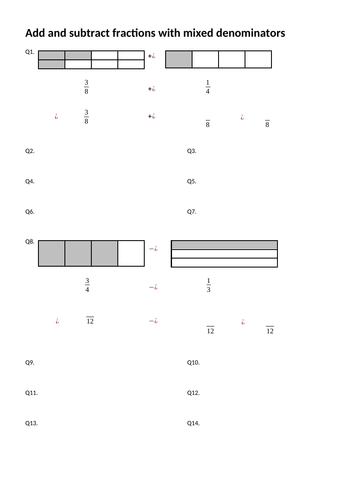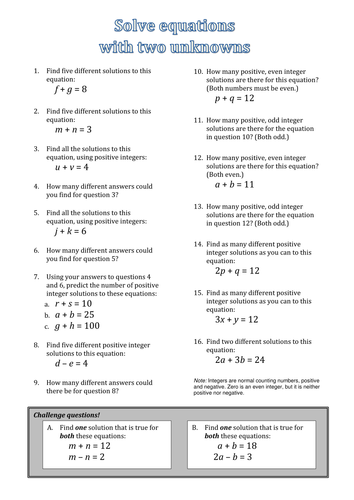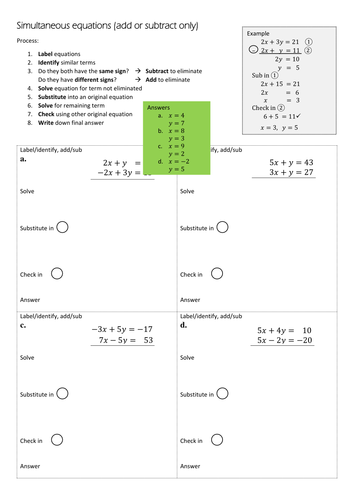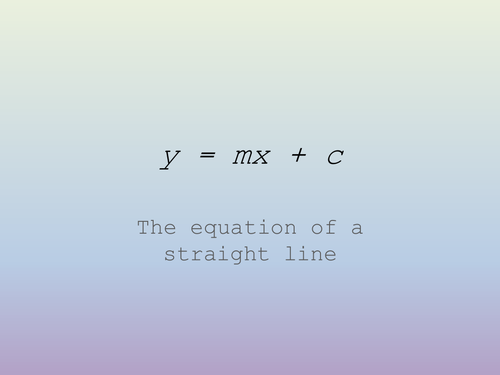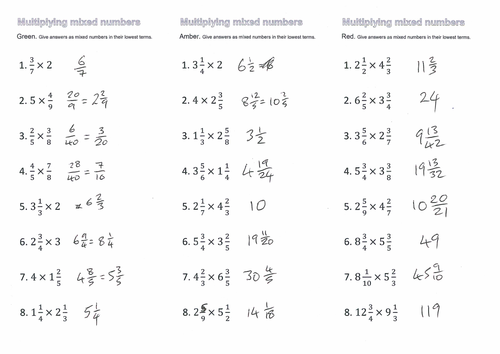
130Uploads
944k+Views
1089k+Downloads
All resources

Chronological age - calculator sheet
Spreadsheet that calculates chronological ages. It works (I hope!) correctly for months of different lengths etc. (No awkward cludges of dividing days by 30 to get months.)
First tab on the sheet is set up so you can enter a whole class. The second tab is just for quickly checking single dates of birth.
The main calculations in the first tab are carried out in columns D to J, which are hidden. If you look at the formulae, you will see that the formula is far from elegant - but calculating chronological ages is not an elegant process! I realise that the year calculation could be simpler, but I couldn't be bothered to edit it...

Interior and exterior angles
Worksheet to draw and measure interior and exterior angles for a pentagon. 2nd worksheet to divide polygons into triangles for total interior angles.
(I have previously posted a worksheet to complete for int/ext angles of regular polygons)
(12/7/16) Answers uploaded for 2nd sheet

Demonstration of surface area & volume of solids
Promethean flipcharts demonstrating surface area and volume of solids. Versions for ActivInspire (Flipchart) and ActivStudio 3.5 (Flp).

I can statements - Y5 to Y8 maths
A set of self-assessment statements with three 'levels' (effectively 'little idea', 'getting there' and 'pretty confident'). Based on the ISEB Common Entrance syllabus for maths but, as this is aligned to the National Curriculum, it should be broadly applicable.
The order of the statements reflects my scheme of work, but of course they can be moved around. I intend to cut them up and paste as a booklet.
For Y7 & Y8 there are two levels, reflecting the fact that CE 13+ has two (main) levels. These might be seen somewhat as early 'foundation' and 'higher'.
There is a need to consider teacher (peer?) validation of self assessments. I will probably ask classes to complete at the end of a unit, perhaps dating their selection. I may initial in the margin if I agree they have reached a reasonable level of mastery. I may also ask for an initial tick before they start a unit.

Rounding rally coach
Partners take turns to coach each other in rounding numbers to required decimal places or significant figures.

Next term in sequence using flashcards
10 questions. Quick, multiple choice, summative quiz. Can use coloured flash cards or whiteboards to get responses. Mainly simple linear, but also geometric and squares to finish.

Maths: Negative calculations using flashcards
10 questions. Quick, multiple choice, summative quiz. Can use coloured flash cards or whiteboards to get responses.

Deal or No Dealgebra
Quiz, loosely based on Deal or No Deal. #1 has brackets but easier numbers; #2 has (simple) algebraic fractions; #3 negative and decimal answers.
The player has an amount of money. The boxes contain algebraic expressions that say what that box is worth. So, if the player has £100, 2x+50 gives a box value of £250.
It could equally be played as a quiz between two teams or individual players trying to get the highest value box.
Original idea inspired by CrazyTalk clips on YouTube linked by Keith Ennis.

Construction of simple 2-D shapes
Construct four triangles and a parallelogram by following instructions. More of the correct technical language used further down the sheet.

Balancing equations demo
Visual of seesaw showing how to keep simple equations balanced while solving. 2 quick examples, but it should be easy to create more by copying and amending slides.

Expand brackets with party bags!
Brackets are compared to party bags! So expanding is just finding out how many items altogether.
Hopefully simple, visual explanation of concept followed by some quick questions. Used alongside mini-whiteboards.

Factorising, functions and graphs
This links factorisation of linear expressions (where the term in the bracket is in the form y=m(x + c/m)) to the intercept with the x-axis. It lays the foundation for the same concept when factorising quadratics. It could be developed by examining y = c - mx or y=m(ax + c/m).

KS3 Maths: Translations race track
Simple intro to translations. Describe movement of car around track using translations. Draw own track and do the same. Promethean flipcharts (old and new versions) and worksheet.

Add/sub fractions with mixed denominators
Short, scaffolded worksheet for adding and subtracting fractions. For lower ability group. (25/1/19 PDF version added.)

Solve equations with two unknowns
Set out algebraically (rather than using picture puzzles). Finding solutions with limits (eg. only positive integers). Challenge questions are (implicitly) simultaneous. Used with bright Y6 group.
(12/7/16) Answers uploaded

Simultaneous equations - add/sub (scaffolded)
Structured for more straightforward simultaneous equations. Just adding or subtracting. (No need to scale.)

y=mx+c step-by-step
A set of 8 graphs to 'talk' through (use mini-whiteboards?) to recognise intercept and gradient

Transformations summary quiz
Flash card (or other) quiz as summary or check-in for 4 basic transformations. 10 Qs. Centre rotation/enlargement not covered or vector form for translation.

Multiplying mixed numbers RAG
Quick set of 8 questions (x3) for multiplying mixed numbers. Answers provided.




